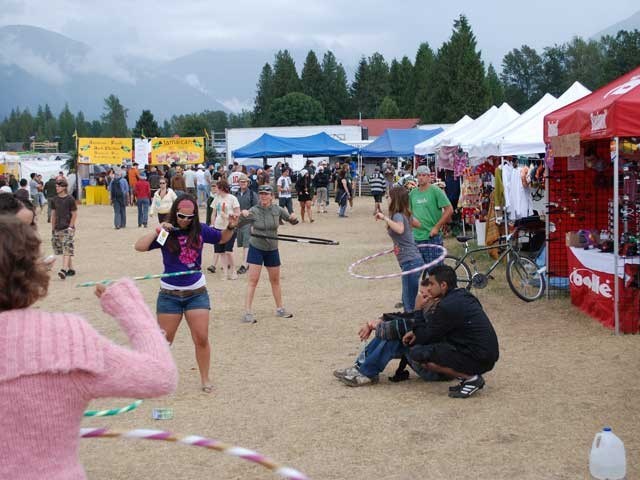The provincial Agricultural Land Commission believes the
three-day Pemberton Festival “debilitates” the quality of the agricultural land
it was held on and organizers should find a new site for the festival.
But Pemberton Mayor Jordan Sturdy, himself a farmer, disagrees
with the ALC.
“I don’t see permanent implications for the viability of that
agricultural land,” Sturdy said.
The ALC, which governs the use of land in the Agricultural Land
Reserve, areas where farming is a priority use, issued a non-farm use permit on
March 12 to allow this year’s inaugural festival. But the permit was only for
2008.
The ALC calls the site, located on Highway 99 about four
kilometres east of the Village of Pemberton town centre “some of the best
agricultural land in the province.”
When asked about the ALC’s reluctance to allow the Pemberton
Festival on the same lands next year, Colin Fry, the executive director of the
ALC, firmly corrected the wording of
Pique
’s
questions.
“I’ll correct one of the words you used, the commission is
‘reluctant’ to allow it,” he said. “The commission has specifically refused it.
There’s no reluctance.”
The ALC also expressed disappointment that it had not been more
closely involved in planning.
Fry said the ALC received the application after months of
dialogue among various parties, but none with the commission.
“The commission received the application very late in the day,”
he said. “At the point we did, we were under pressure to deal with it quickly
to determine if it was going to be allowed so that ongoing planning could
continue.”
Normally used as a hay field, the site has been designated as
Class 1 and 2 agricultural capability under the Canada Land Inventory,
according to minutes from the March 12 meeting of the ALC.
That means it has no or very slight limitations to its use for
production of agricultural crops, according to the minutes.
The ALC is concerned that the long term use of the site as a
festival venue could “debilitate” the quality of the land and that it is
“simply not the place to hold such an event.” It has suggested that organizers
find a non-agricultural site to hold the festival in future.
“The festival is more appropriately suited to be located
outside the ALR,” Fry said. “The long term use of this festival was not in tune
with the mandate to use the site as agricultural land.”
Shane Bourbonnais, president of touring and business
development for Live Nation and the chief organizer of the Pemberton Festival,
said planners checked out three sites of a similar size before putting on the
event, including the one where it was eventually held.
Another site was located east of that property, while the third
was located northwest of the site.
One, according to Bourbonnais, was a little bit smaller than
the festival site and another a bit bigger. The larger site was not feasible
because it was a marshy area.
With regard to the ALC, he said the application for non-farm
use went into the commission in January, a move that came three months after he
sat down with the Pemberton community to see if residents wanted to have the
festival there.
Just before Christmas he found out which parties he would need
to consult before the festival could happen.
“Christmas break happened and in January is only really when we
figured out we were going to move forward with a festival,” he said. “We ran it
on a very, very short runway.”
When asked whether he’ll be seeking another site for next
year’s festival, Bourbonnais said he hasn’t gotten to that point yet.
“Right now the biggest thing is we want to make sure that the
Pemberton community wants to have us back,” he said. “If it does, at that time
we’ll sit down with the ALC and the property owners and we’ll see what we can
put together for 2009.”
Sturdy doesn’t see the festival being incompatible with
farming.
“What we’re doing is we’re looking at that as a piece of
property that would be used for farming by hay production and then used as a
festival and then back into hay production.”
By way of comparison, Sturdy said his farm turns into a pumpkin
patch when October rolls around. At that time of year he drives a horse-drawn
wagon through the patch — not a good thing for the land, he said, but
it’s the cost of doing business in October.
“We create gigantic ruts in the ground where the wagon is,” he
said. “That’s the cost of doing business and I recognize that it’s not ideal,
but it’s part of what we sell in the pumpkin patch ride.
“The impacts that we create on that area where we put a road in are dramatically different or more significant than impacts that have taken place as a result of the Pemberton Festival.”




